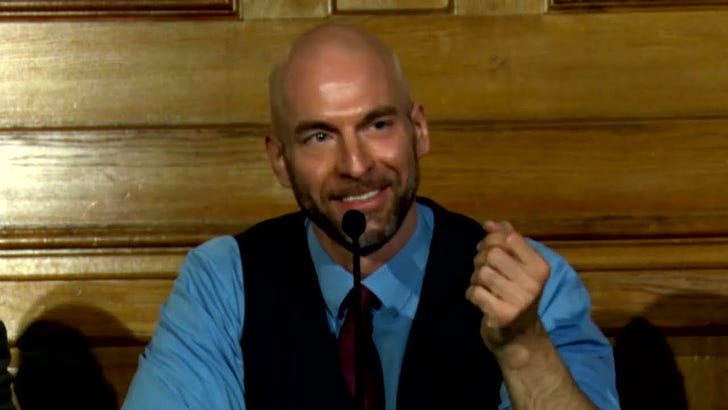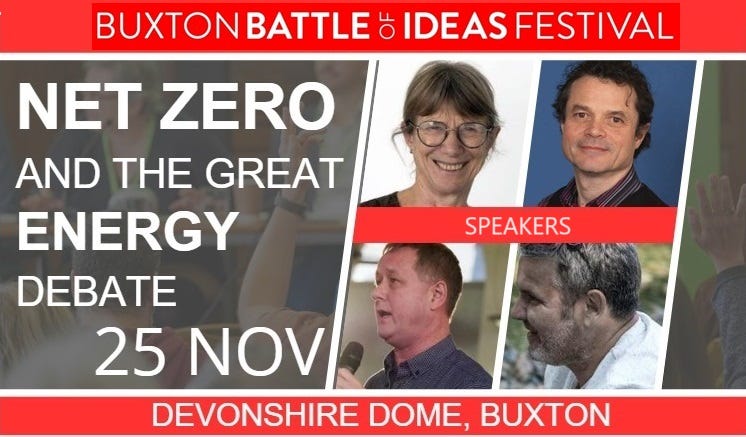Net Zero and the great energy debate
Join us at the Buxton Battle of Ideas festival to debate whether green thinking will help or hinder our need for energy.
We regularly hear that renewable energy is the future. Not only is it good for the planet, but also that is cheaper than fossil fuels and, because we can produce lots of our own renewable energy, it’s more secure, too, making us less reliant on the world market. After the Covid lockdowns and the war in Ukraine, having some insulation from the vagaries of events beyond our control seems very attractive.
But last week, the UK government announced a new auction for renewable energy that potentially could increase prices by up to 66% on offshore wind. Wind turbine manufacturers like Siemens and Ørsted are in financial trouble, too. Texas, which has more wind power than anywhere else in the US, has just passed a measure to support non-renewable sources of energy that are more reliable. And all that set against a background in which we all face another hard winter of high energy prices. Should we really go ‘all in’ on wind and solar to keep the lights on?
That’s why it’s worth watching this debate from the Battle of Ideas festival in London, Can renewables power the world?, featuring Prof Dr Michaela Kendall, Simon Nash, Dr Ralph Schoellhammer and Prof James Woudhuysen. We’ll be discussing these issues and more at Buxton Battle of Ideas festival on Saturday. Find out more below.
NET ZERO AND THE GREAT ENERGY DEBATE
This debate is part of Buxton Battle of Ideas festival. For further details and tickets, click here.
The UN secretary general has declared that we are now in an era of ‘global boiling’. Every leading politician talks about reducing greenhouse-gas emissions to ‘net zero’ – with the few emissions the economy does produce balanced by some method to soak them up, from planting trees to carbon capture and storage. As a result, a timetable has been created to eliminate emissions, step by step, between now and 2050.
Proponents of net zero argue that the process could be a creative one, leading to the development of new technologies and millions of well-paid ‘green’ jobs. Moreover, they point to opinion polls which suggest that the idea is popular with the public.
But is net zero even achievable? The main area for decarbonisation is the energy sector. Proponents argue that renewables like wind and solar are cheaper and cleaner than fossil fuels. Moreover, with energy prices rising globally, they have the advantage of being secure because the energy is produced in the UK.
However, opponents argue that the reality is very different. Where countries have embraced renewables, energy costs have risen. Because wind and solar are unreliable, they must be backed up with other energy sources. Given that storage is hugely expensive at the moment, the backup is gas and coal – effectively meaning paying twice for energy. Already, firms are shutting down or relocating because of high energy prices – in particular, to the US, where the exploitation of shale gas through fracking has kept prices low.
While net zero seems popular in the abstract, the policies designed to make it happen – like bans on gas boilers and petrol cars – are much less so. Moreover, with unanimity among the major parties in the UK that net zero is an inviolable policy, there is no electoral route to push back against such policies, except to vote for smaller parties with little hope of winning seats in the near future. Indeed, for some environmentalists, there can be no choice in the matter: if necessary, democracy must be sacrificed to the need to cut emissions.
That said, the Uxbridge by-election – which became something of a referendum on Sadiq Khan’s ULEZ policy – seems to have caused consternation among the major parties. Even though net zero itself wasn’t in question, a major environmental initiative seemed to be resoundingly rejected at the ballot box as a war on motorists. Politicians are now reassessing their assumptions about a wide range of green policies.
Is net zero an unpleasant necessity or, more positively, the start of a new industrial revolution? Or is it a policy that is being pursued without the technical means of achieving it in an affordable fashion? Do we need more investment in reliable low-carbon energy like nuclear? Will the backlash against net zero increase – and will it even matter if governments are determined to pursue it, whether we like it or not?
Speakers:
Joanna Collins: Green Party councillor, High Peak Borough Council
Dr Caspar Hewett: lecturer and degree programme director, Water Group, EuroAquae+, School of Engineering, Newcastle University; director, The Great Debate
Mark Hill: accountant; coordinator, Green Leaves; Green Party member
Rick Moore: business owner, InControl; electronic engineer; deputy chair political, Blackburn Conservative Association
Chair - Austin Williams: director, Future Cities Project; honorary research fellow, XJTLU, Suzhou, China; author, China’s Urban Revolution; convenor, Critical Subjects Architecture School
Readings:
‘Era of global boiling has arrived,’ says UN chief as July set to be hottest month on record, Ajit Niranjan, Guardian, 27 July 2023
Plans for oil boiler ban from 2026 dubbed a 'ULEZ' for rural households, Joseph Mullane, Homebuilding & Renovation, 9 August 2023
How green policies are fuelling the energy crisis, Rob Lyons, Spiked, 9 January 2022
Starmer blames Sadiq Khan’s Ulez for Uxbridge flop: ‘He needs to reflect’, Adam Forrest and Archie Mitchell, Independent, 21 July 2023
Reaching Net Zero - what does this mean for democracy in the UK?, Amy Baker, Carnegie UK, 27 September 2023




